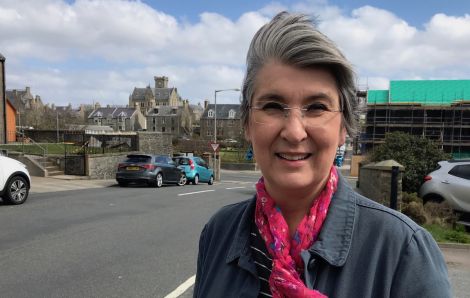Shetland Lives / Award-winning South African novelist gives NHS Shetland a voice
In 2017, novelist Carol Campbell left her home in South Africa to begin a new chapter in Shetland. She shared her fascinating story with Genevieve White.
The Great Karoo is a vast semi-desert in central South Africa. You would think this dry expanse must surely be as far removed from Shetland as is possible but Carol Campbell sees definite similarities.
“One of the things that appeals most to me about Shetland is the landscape,” she says. “When we lived in the Karoo, in the village of Prince Albert, the nearest ‘big’ town was two hours’ drive away. It is a landscape that, like Shetland, has no trees and, to the uninformed eye, is just brown. But, like Shetland, it is ‘big sky’ country and with far more going on than one realises.”
There are cultural similarities too. “Karoo people are family and community-orientated. It must be something which comes from living in a remote area. There is also a culture of dance and music too but maybe not as strong as it is here.”
The daughter of journalist parents, Carol was born and raised in Johannesburg. After completing a degree in drama, she worked in newspapers, covering South Africa’s turbulent transition to democracy during the 1990s.
Despite an eventful early adulthood, it was the twelve years in the Karoo which had the most profound impact on her and inspired her writing. She and her husband, Colin, moved to Prince Albert in 2000 and bought the petrol station. Her three novels (published by Penguin Random House) are based on the relationships she formed during these years – in particular with a nomadic family of donkey cart people.
“These folk are known as karretjiemense and are the descendants of the Khoisan. The old ways are largely gone now and they are becoming increasingly westernised. Still they live lives of absolute poverty. I could see how ancient knowledge was being lost.
“For instance Saul, the father, knew how to find water in the desert landscape but couldn’t draw money from the bank. His children were far more versed in the ways, and trappings, of the modern world but were not particularly interested in their inherited knowledge.”
Become a member of Shetland News
I asked Carol to tell me more about the people with whom she developed such an affinity. “The donkey cart people earn what little they have through farm labour, mostly sheep shearing or spanning fences. Often all they have to eat is what they find, which could mean roadkill. They have lived off the landscape for so long that they somehow find a way to survive.”
Although elements of the donkey-cart people’s life might seem appealing – in the sense that they refuse to absorb the anxiety of the modern world – the deprivation they endure comes with social problems like alcoholism and tuberculosis. It was the latter which eventually claimed Saul.
“Saul and I became very good friends and genuinely just liked each other. But it was an unbalanced relationship – I was the one with the resources and, while he needed me in a material sense, in the end he taught me more about human nature and life than anything I could have ever given him.”
A large part of Carol’s involvement with the family was when she helped them get identity documents – a process that took three years.
“There was no record of them, no birth certificates, no written history, nothing. Because of this they were unable to access services like medical treatment, schools for the children or welfare grants. And, they had no voice because they could not vote.”
It was this journey which inspired her first novel: My Children Have Faces which went on to win the South African Literary Award in 2015 for a debut novel.
Her next two novels again focused on social issues on the Karoo. Esther’s House, which won the Aziz Hassim Literary Award, explores South Africa’s housing crisis and how, after Apartheid, the government tried to make good on its promise to give everyone a roof over their head.
“But the system was soon corrupted and, even today, there remain many instances of queue jumping. The book explored the housing issues and what eventually drove a law-abiding person to break the law.”
Carol has recently returned from South Africa, where she launched her third novel, The Tortoise Cried Its Only Tear. In this novel, she turns her attention to education and a little school called Seekoegat Primary on the road between the town of Beaufort West and settlement of Klaarstroom. “It is the story of three children and how small acts of kindness and the impact of education can change the course of a life.”
Her books are critically acclaimed in South Africa and are also on the academic programme of several United States schools and colleges. The film rights for My Children Have Faces and Esther’s House have been sold to South African filmmakers. Carol is surprised at the warm reception they have received.
“These were not stories that were going to ever be told and it has been a privilege to be able to bring them into the public domain and give insight into the lives of people living on the margins.”
After the Karoo years, the Campbell family moved to Durban, where Carol worked for Independent Newspapers eventually becoming Assistant Editor of the regional Sunday Tribune. However, with life in South Africa becoming increasingly hard, the family decided to move on again – this time to the United Kingdom and Shetland.
Carol is now the communications officer for NHS Shetland. Asked about her future plans she said: “We’ve no plans to leave Shetland. We’ve a house here, my younger son is in high school and we’re settled. I love the landscape and the wildlife here: although it’s very different from the lions, elephants and rhinos I grew up with!”
Let’s hope that Carol will find Shetland as inspiring a writing base as she found the Great Karoo.
Carol’s books are available in the UK as downloads only, but copies can be borrowed from Shetland Library.
Become a member of Shetland News
Shetland News is asking its many readers to consider paying for membership to get additional features and services: -
- Remove non-local ads;
- Bookmark posts to read later;
- Exclusive curated weekly newsletter;
- Hide membership messages;
- Comments open for discussion.
If you appreciate what we do and feel strongly about impartial local journalism, then please become a member of Shetland News by either making a single payment, or setting up a monthly, quarterly or yearly subscription.






























































